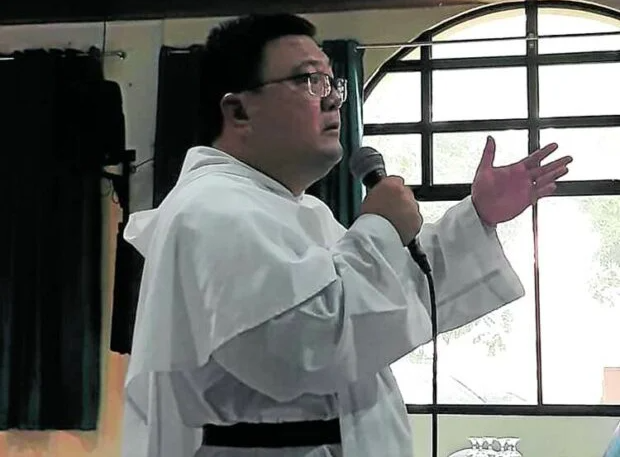
Fr. Winston Cabading (Photo from the Facebook page of Adsum, the official publication of the Diocese of Bacolod)
MANILA, Philippines — Two weeks after an exorcist priest was arrested for “offending religious feelings,” the Catholic Bishops’ Conference of the Philippines (CBCP) has “begged forgiveness” for what CBCP head and Caloocan Bishop Pablo Virgilio David said was “indicative of shortcomings [among] Church leaders.”
“We humbly beg forgiveness for this shortcoming. That a Catholic would feel the need to seek recourse to the civil court for the resolution of an issue that has to do with matters of faith is extremely disheartening, to say the least,” he said in a statement sent to the Inquirer.
David was referring to Fr. Winston Cabading who was arrested on May 13 after being sued by former Sandiganbayan Justice Harriet Demetriou for allegedly “offending [her] religious feelings” and those of her fellow Marian devotees, a violation of Article 133 of the Revised Penal Code.
While the Catholic clergy was “perplexed” by the criminal complaint against Cabading, adding that it causes “a scandal to the faithful,” David acknowledged that Church leaders fell short in “facilitating dialogue and fostering communion, especially when brothers and sisters in the same Catholic Church are in conflict with each other over matters of faith.”
Pitfalls of social media
The CBCP head also blamed the digital age for the issue’s traction online “when individuals and groups that are for or against [an] issue can quickly react against each other in various social media platforms in a manner bereft of Christian charity.”
Although several Catholic lay groups and Church leaders have expressed support for Cabading, David said the CBCP was “constrained by law from making statements that may violate the sub judice rule.”
She briefly spoke with the Inquirer on Saturday hours before the CBCP issued the statement.
‘Remnant of the Dark Ages’
Cabading’s arrest also drew objections from Albay Rep. Edcel Lagman, who earlier filed a bill seeking to repeal the “archaic” provision in the Revised Penal Code that he describes as “an odious remnant of the Dark Ages.” Filed in 2022, House Bill No. 1477 is now pending before the House Committee on Justice.
Demetriou said the 57-year-old Dominican priest was being put on trial for violating Article 133, which is “a statutory law of the Philippines and not of any Catholic doctrine.”
Under this provision, anyone “who, in a place devoted to religious worship or during a religious ceremony… performs any act notoriously offensive to the feelings of the faithful,” may face up to six years in prison if found guilty.
‘Leading questions’
In her complaint filed in December last year, Demetriou accused Cabading of acting with “utmost malice and impunity in mocking and holding in contempt the laity’s devotion to Mary, Mediatrix of Grace,” after the exorcist priest cited a finding of a special Church commission created in 1951 that dismissed as “exclud[ing] any supernatural intervention” the purported apparitions in Lipa, Batangas province, in 1948.
The former antigraft court justice also cited Cabading’s statements on the online program of Bro. Wendell Talibong on May 28 last year, which discussed the flow of supposedly fragrant oil from the face and hands of the Marian icon.
She referred as well to Cabading’s interview with another priest during the 4th National Conference on the Ministry of Spiritual Liberation and Exorcism in August 2019, where the priest allegedly “asked leading and open-ended questions… with the end view of instigating a defect in the already vulnerable image of Our Lady, Mary, Mediatrix of All Grace.”
In a commentary published in the Inquirer last year, Demetriou said she wanted “to save (the Marian devotion) from irrelevance after officials of the Catholic Church separated it from the phenomenon that gave birth to it—the Marian apparition in Lipa.”
Never again
Lagman said Cabading “must not suffer the miserable fate” of activist and performance artist Carlos Celdran, who was sued for the same offense by Catholic lay groups in 2013.
Celdran had dressed up as Jose Rizal and held up a placard that read “Damaso,” the villainous friar in Rizal’s “Noli Me Tangere” novel during an ecumenical meeting of the CBCP in 2010.
He was protesting the Church’s stand against the reproductive health bill that was then pending in Congress. Charged and convicted, Celdran was sentenced to more than a year in prison in 2018. He died in Spain in 2019.
Lagman stressed that Article 133 imposes “prior restraint on free speech.”
“What the 1987 Constitution protects is more than docile and conventional speech. It truly safeguards controversial and provocative views which challenge audiences,” he added.
RELATED STORIES
Laity groups, clergy rally behind arrested exorcist
PH lead exorcist receives 10 suspected cases a day
‘Demonic texts’: The enemy can use technology, says exorcist